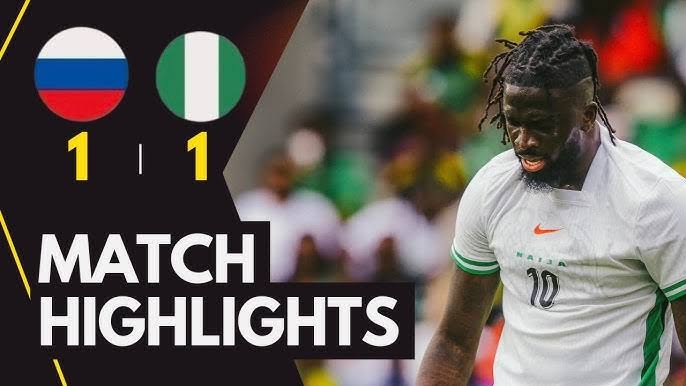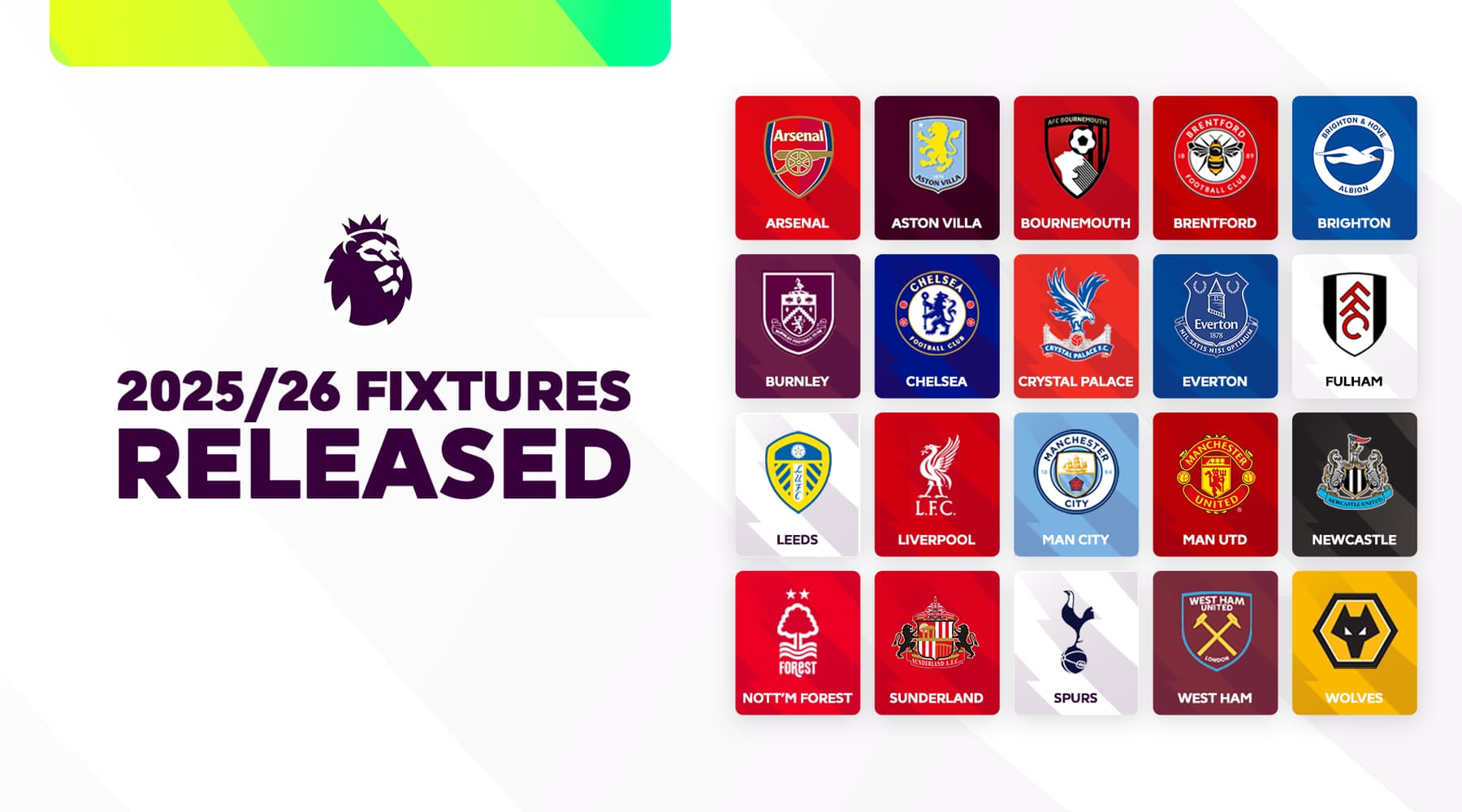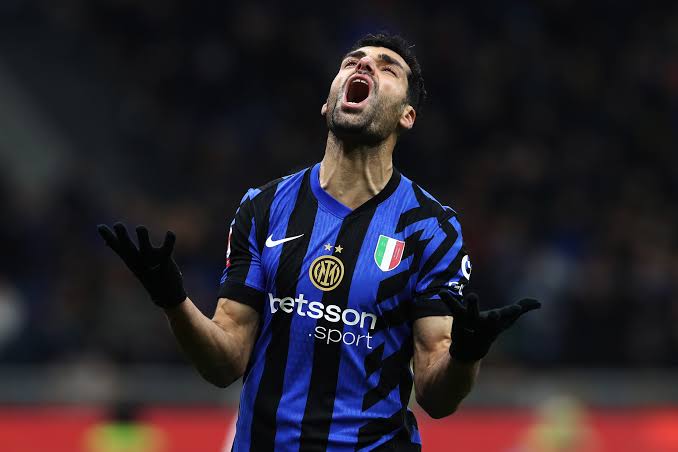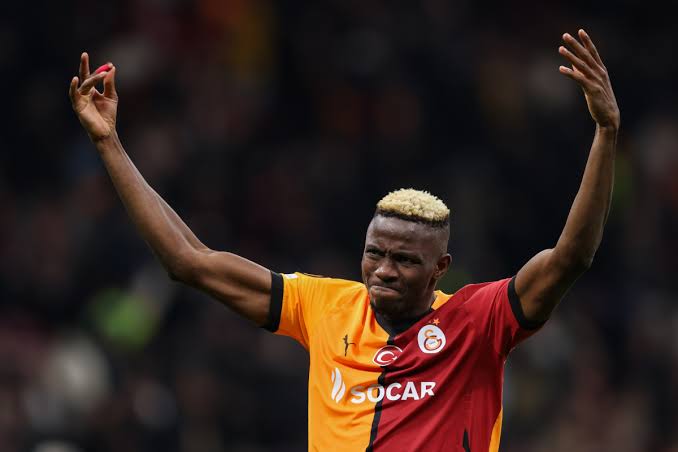Nigeria’s Super Eagles played out a hard-fought 1-1 draw against Russia in an international friendly at the Luzhniki Stadium in Moscow, marking the first-ever senior-level encounter between the two nations. Under the guidance of coach Eric Chelle, the Super Eagles showcased resilience despite missing key players, extending their unbeaten streak to seven matches across all competitions. The match, attended by thousands of fans in the iconic Russian venue, served as a crucial test for Nigeria ahead of their 2026 FIFA World Cup qualifiers.
The game began with both teams displaying cautious yet purposeful play, with Russia leveraging their home advantage to control early possession. In the 27th minute, Russia took the lead through an unfortunate own goal by Nigerian defender Semi Ajayi, who inadvertently redirected a low cross from Russian left-back Danil Krugovoy past goalkeeper Maduka Okoye. Despite the setback, Nigeria remained composed, with Okoye making a critical save to deny Russia’s Aleksey Batrakov before halftime, keeping the score at 1-0.
Nigeria’s response came in the second half, with coach Chelle introducing debutant striker Tolu Arokodare in the 65th minute. Arokodare made an immediate impact, capitalizing on a fumble by Russian goalkeeper Matvey Safonov in the 71st minute to score the equalizer, marking his first international goal for Nigeria. The goal sparked celebrations among the traveling Nigerian supporters and shifted the momentum as the Super Eagles pressed for a winner in the closing stages.
The Super Eagles’ lineup featured a blend of experience and youth, with Maduka Okoye in goal, a defensive line of Bright Osayi-Samuel, William Troost-Ekong, Semi Ajayi and Bruno Onyemaechi, and a midfield anchored by Frank Onyeka, Raphael Onyedika and Fisayo Dele-Bashiru. Up front, Christantus Uche, Moses Simon, and Victor Boniface led the attack, with Boniface creating several dangerous moments despite not finding the net. The absence of stars like Victor Osimhen, Ademola Lookman, Alex Iwobi, and Ola Aina tested Nigeria’s depth, but the team’s cohesion and tactical discipline were evident throughout.
Russia, coached by Valery Karpin, fielded a strong side featuring players like Arsen Zakharyan and Fedor Chalov, aiming to extend their eight-game winning streak. However, Nigeria’s resolute defending, led by captain William Troost-Ekong, and Okoye’s heroics in goal frustrated the hosts. A late header from Russia’s Dmitri Barinov sailed over the bar in the 89th minute, ensuring the match ended in a stalemate after four minutes of stoppage time.
Post-match reactions highlighted the significance of the result for Nigeria. Coach Chelle praised his team’s character, noting their ability to adapt against a formidable opponent on foreign soil. Russian coach Karpin acknowledged Nigeria’s attacking threat, particularly praising the pace and physicality of the Super Eagles’ forwards, while expressing disappointment at his team’s failure to convert late chances.
Social media platforms, particularly X, buzzed with reactions from Nigerian fans and analysts. Many lauded Tolu Arokodare’s impact off the bench, with some calling for his inclusion in upcoming World Cup qualifiers against Rwanda and South Africa in September 2025. Others highlighted standout performances from Okoye, Onyeka, Onyedika, and Dele-Bashiru, though some fans noted defensive lapses that led to Russia’s goal as an area for improvement.
The match provided valuable insights for both teams. For Nigeria, it underscored their growing momentum under Chelle, who has instilled a robust tactical framework since taking charge. The draw against a Russian side ranked higher in FIFA’s standings was a confidence booster, especially given the absence of several first-team regulars.
Statistically, the game was evenly contested, with Nigeria holding 48% possession compared to Russia’s 52%. The Super Eagles recorded 12 shots, four on target, while Russia managed 14 shots with five on target. Nigeria’s passing accuracy stood at 82%, slightly below Russia’s 85%, but their defensive solidity—evidenced by six successful tackles and 10 interceptions—ensured they remained competitive throughout.
This friendly was a strategic move by the Nigeria Football Federation to prepare the team for the challenges of World Cup qualifying. The Super Eagles’ next fixtures include a crucial double-header against Rwanda and South Africa, where a positive result could solidify their position in Group C of the African qualifiers. The experience gained in Moscow, particularly for younger players like Uche and Arokodare, will be invaluable as Nigeria aims to secure a spot at the 2026 World Cup in the USA, Canada, and Mexico.




